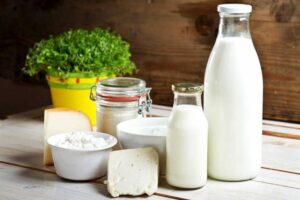
In December 2025, Ukraine exported 10.38 thousand tons of dairy products worth $25.92 million, which is 0.3% and 6% less than in November, but 44% and 51% more than in December 2025, according to the Association of Milk Producers (AMP).
The industry association noted that in January-December 2025, Ukraine exported 131.91 thousand tons (+12% compared to the same period in 2024) of dairy products worth $401.36 million (+35%).
Analysts specified that the main export categories in December were milk and condensed cream (36%), cheese (22%), and butter (21%).
According to their information, in December 2025, Ukraine increased the volume of exports of milk and cream, not condensed, to 2.58 thousand tons (+13%), milk and cream, condensed, to 3.63 thousand tons (+5%), fermented milk products to 575 tons (+14%), butter to 836 tons (+13%), and ice cream to 336 tons (+6%) compared to November. The volume of whey exports decreased to 1 thousand tons (-22%) and cheese to 1.24 thousand tons (-3%) compared to the previous month.
Compared to December 2024, Ukraine increased its physical exports of milk and cream, condensed (+90%), fermented milk products (+50%), butter (+91%), and cheese (+45%) to foreign markets the most.
At the same time, compared to November 2025, cash proceeds for shipped milk and cream, non-condensed, increased to $2.09 million (+11%), milk and cream, condensed, to $9.23 million (+5%), fermented milk products to $984 thousand (+32%), ice cream to $1.29 million (+10%), butter to $5.41 million (+7%), but decreased for shipped whey to $1.11 million (-23%) and cheese to $5.8 million (-5%).
Compared to December 2024, the largest increase in cash proceeds was for exported milk and cream, condensed (+68%), fermented milk products (+78%), and butter (+60%). Cash proceeds for exported whey decreased (-5%).
“The unpredictable increase in milk production during 2025 led to an accumulation of exchange goods in European warehouses and a collapse in world prices for butter and other dairy products. Activity in the dairy market traditionally slows down at the end of the year, during the New Year holidays, which naturally led to a reduction in exports from Ukraine. In early January, exports of dairy products from Ukraine to Europe effectively stopped due to changes in EU requirements for licensing export volumes within quotas. The procedure, developed at the end of December, was not actually provided to anyone, which meant that Ukrainian processing companies, together with their partners who import Ukrainian dairy products, were unable to submit applications for export permits in a timely manner,” explained AVM analyst Georgiy Kukhiashvili.
The industry association drew attention to the increase in imports of dairy products from the EU to Ukraine, in particular cheese and butter, which are supplied to domestic retail chains from Poland. In December 2025, the country imported 6.52 thousand tons of dairy products worth $37.28 million. Compared to November 2025, natural import volumes increased by 17%, and compared to December 2024, they decreased by 14%.
In January-December 2025, Ukraine imported 64.69 thousand tons (+7%) of dairy products worth $337.93 million (+16%). Cheese accounted for the largest share of total imports during this period (65%).
“The foreign trade balance in December was negative and amounted to -$11.36 million, probably due to the influx of cheap condensed milk and cheese into Ukraine and a decrease in the volume of dairy product exports,” the AVM summarized.
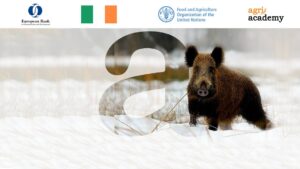
AgriAcademy, a professional online course platform for agribusiness, announces the launch of a new free online course, ‘Biosecurity for Hunting Farms’, developed by experts from the Food and Agriculture Organisation of the United Nations (FAO) in response to one of the most serious threats to livestock and food security – African swine fever (ASF).
African swine fever remains one of the key biological risks for Ukraine. The virus is highly resistant in the environment and circulates continuously among wild boar populations, posing a constant threat to domestic livestock, hunting farms and related sectors.
That is why FAO experts have developed a specialised training course based on international experience in combating ASF, adapted to Ukrainian realities and wartime conditions.
What the course is about
The course focuses on the practical aspects of biosecurity for hunting farms in Ukraine, using ASF control as an example. It examines in detail the logical and effective sequence of actions applied in EU countries and other regions of the world:
Who is this course for
The training is designed for:
Practical outcome for participants
Upon completion of the course, participants will be able to:
Training format
The course includes video lectures, analytical materials, practical tools, real-life case studies and a final test. Training is conducted online in a convenient 24/7 mode.
Course author and lecturer
Oleksandr Revnivtsev, FAO international consultant on animal husbandry.
Training on the course is free and open to all registered users of the AgriAcademy platform.
Participants can study the materials online at their convenience, without time restrictions, and after successfully completing the final test, they will receive a certificate.
As a reminder, AgriAcademy – is a free online learning platform created on the initiative of the EBRD as part of its food security support programme in Ukraine. Its goal is to strengthen the competitiveness and sustainable development of agriculture, which has suffered significant losses due to the war.
The creation and management of the platform (including the development of courses, training tours, etc.) is carried out with the support and funding of the EBRD, as well as:
The AgriAcademy website currently offers over 30 free online courses for Ukrainian agribusiness professionals. Register and take courses at your convenience!
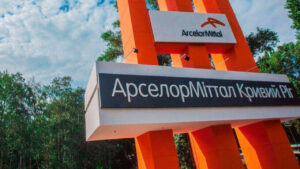
In 2025, the Kryvyi Rih plant increased its production of 6% moisture coke by 16.4% to 1 million 460.3 thousand tonnes. This allows it to meet its own needs for main production.
At the same time, the mining department, whose work depends on a stable power supply, showed a decline:
– Iron ore concentrate production fell by 3.3% to 7.56 million tonnes.
– Iron ore mining decreased by 4.2% to 18.4 million tonnes.
Management explained this as a direct result of energy supply restrictions caused by attacks on infrastructure, which caused the mining complex to operate below pre-war levels.
ArcelorMittal Kryvyi Rih is the largest producer of rolled steel in Ukraine. It specialises in the production of long products, in particular, rebar and wire rod. The company has a full production cycle, with production capacities designed for an annual output of over 6 million tonnes of steel, more than 5 million tonnes of rolled products and over 5.5 million tonnes of pig iron.
ArcelorMittal owns Ukraine’s largest mining and metallurgical complex, ArcelorMittal Kryvyi Rih, and a number of small companies, including ArcelorMittal Beryslav.
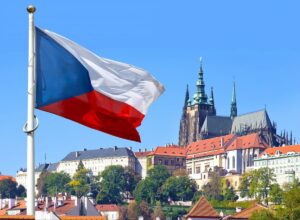
The new Czech government intends to prepare guarantee and insurance programmes for companies planning to operate in the Ukrainian market in order to reduce the risks associated with project implementation and deliveries, said First Deputy Prime Minister and Minister of Industry and Trade of the Czech Republic Karel Havlíček.
Havlíček noted that Ukraine was previously among the Czech Republic’s five largest trading partners outside the EU, and, in his estimation, mutual trade is showing signs of recovery after a decline during the war. He stressed that the state can play a practical role in helping businesses participate in projects in the energy sector, transport infrastructure and, in particular, the construction of hospitals.
According to the official, teams from both countries are already working on economic contacts, initially online, followed by face-to-face meetings between business representatives and relevant government agencies.
As reported, the new Czech government headed by Andrej Babiš was sworn in on 15 December 2025.
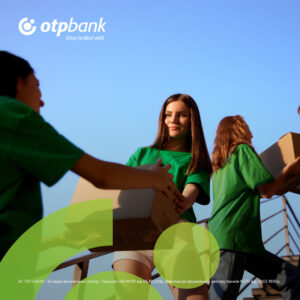
In 2025, JSC OTP BANK made charitable transfers for almost UAH 67 million. The bank systematically interacts with charitable organizations that implement socially significant programs and help Ukrainians, as well as implements important initiatives within its own OTP Bank Helps Ukraine project.
“The purpose of OTP Bank’s charitable activities is to create a real and tangible impact on the lives of as many people as possible. We are talking about helping children, supporting the healthcare sector, and providing Ukrainian defenders with life-saving elements. We deliberately combine large-scale programs that we consistently implement year after year with targeted initiatives that respond to specific human needs. It is important that every hryvnia allocated to charity works to support, restore and ensure a decent future for citizens today and in the long term,” said Lesia Syrota, team leader of the OTP Bank Helps Ukraine charity project, Director of Retail Sales and Network Management at OTP Bank.
Among the priority long-term projects for OTP BANK is the support of the Superhumans Center, where more than 1.5 thousand patients have received help since April 2023, more than 1.3 thousand prostheses have been made and more than 1 thousand operations have been performed. In December 2025, the financial institution launched a Christmas charity auction. The bank will double the funds raised and use them for the treatment and rehabilitation of Ukrainians who were injured or lost limbs in the war. In total, during the period of cooperation, the prosthetics and rehabilitation center has received more than UAH 40 million of charitable support from OTP BANK.
Another program that has become a sustainable tradition is OTP Kids Camp, which OTP Bank organizes jointly with the Charity Foundation Blagomay, OTP Bank in Hungary and JSC Ukrzaliznytsia to give Ukrainian children the opportunity to relax and recover. The first camp took place in Hungary in 2023 and treated 150 children from the frontline regions. In 2024, 117 children had a summer camp in Budapest. This year, 160 children attended the OTP Kids Camp in the summer, and in the fall, the camp opened its doors to 40 more Ukrainian children for the first time.
The OTP Bank Helps Ukraine community also consistently implements theFirst Embroidered Shirtsinitiative. In two years, 854 children received their first ever embroidered shirt on the occasion of the Vyshyvanka Day.
OTP BANK actively and systematically supports DrukArmy: the bank’s employees purchased 16 3D printers, which are used to print training models and equipment for the defenders. Every month, the team donates for plastic and periodically holds charity events, involving customers in raising funds for raw materials. The total amount of donations has already exceeded UAH 16 million.
Together with the Serhiy Prytula Charitable Foundation, the financial institution held a charity auction “Free Sky at 34” in the OTP Bank UA mobile application. The UAH 1.85 million raised was used to strengthen Ukraine’s defense capabilities.
Thanks to the benefactors of the OTP Bank Helps Ukraine program, UAH 250 thousand was allocated for repairs in the dormitory of the Udaytsia Educational and Rehabilitation Center, where 65 children live. On the eve of the New Year holidays, OTP BANK employees became assistants of St. Nicholas and made the dreams of the children of this institution and Chernihiv Center for Social and Psychological Rehabilitation come true. Warm clothes, shoes, rugs, pillows, power banks, construction sets, dolls, headphones, sweets and other gifts worth more than UAH 750 thousand were purchased by the bank’s employees at their own expense and delivered to the children. The bank’s team also provided sweet gifts for the Christmas and New Year holidays to the residents of the Nizhyn orphanage (Chernihiv region), and the institution itself received the necessary hygiene products that its children need on a daily basis. The total cost of the charity initiative was UAH 204 thousand.
That year, within the framework of OTP Bank Helps Ukraine, the bank raised and allocated UAH 250 thousand for medical equipment for the Rehabilitation and Palliative Care Center at the Vinnytsia Regional Specialized Children’s Home, UAH 156 thousand for the equipment of a sports hall. UAH 156 thousand to equip a sports ground in the orphanage in Stryzhavka (Vinnytsia region); UAH 143 thousand to install new windows in the medical center of Mostyshche special school (Kyiv region); UAH 84 thousand to improve the living conditions of the pupils of the educational and rehabilitation center “Nadiya” (Cherkasy region). All charitable initiatives can be found at the link.
OTP Leasing LLC, a member of OTP Group in Ukraine, donated more than UAH 5.9 million to charity in 2025.
Since February 2022, the total contribution of OTP Group in Ukraine to help the state and Ukrainians has exceeded UAH 282 million.